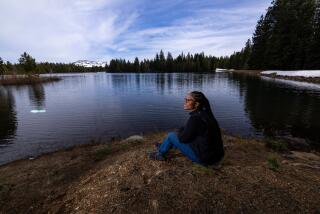Celebrating a historic town’s centennial
- Share via
In 1908, Lt. Col. Allen Allensworth, a charismatic ex-slave and retired military man, set out to build an all-black community on a hardscrabble patch of land 40 miles north of Bakersfield.
This weekend, the centennial of his long-shuttered town will be honored by thousands of Californians trooping to the site, now known as Colonel Allensworth State Historic Park.
Though it thrived for less than a decade, the town strikes a special chord among many, who see it as a pioneering effort in black self-determination.
“That group in the first 50 years after emancipation was probably the most dynamic group we’ve had,” said Rick Moss, chief curator of the African American Library & Museum at Oakland. “Allensworth is a real testimony to their drive, their dignity, their willpower -- it’s all right there.”
Moss is among the speakers at the two-day celebration. So is Lonnie G. Bunch III, founding director of the Smithsonian’s National Museum of African American History. The Crenshaw High School Elite Choir and actor William Allen Young will be among the entertainers making appearances.
Amtrak is establishing special bus and train routes to the park from Los Angeles, Inglewood, Sacramento, Oakland and elsewhere. (Details are available at www.parks.ca.gov/). About 5,000 visitors are expected -- far more than the couple of hundred residents who lived in Allensworth at its height.
Visitors will tour the town’s three remaining original buildings and 19 that have been reconstructed. The hamlet boasted a hotel, a school, a library, a church, a general store -- the basic municipal amenities that its settlers had found wanting.
A state historic park since 1974, Allensworth was recently the focus of a battle over plans for a 12,000-cow dairy on adjacent land. After concerted protests from black community groups, the state last year paid the landowner $3.5 million to give up his rights for any kind of livestock operation.
Funded by donations, Saturday and Sunday’s event is sponsored by the state’s Legislative Black Caucus, the California State Parks Foundation and the state parks department.
“We’re honoring the vision of these people from 100 years ago,” said state parks director Ruth Coleman. “At a time when white supremacy was so rampant, they created this town to demonstrate their self-sufficiency, to prove that blacks could do everything whites could do.”
As a youth, Allensworth was sold in the slave markets three times -- once for daring to learn how to read. In a remarkable career, he fought on Navy gunboats in the Civil War and served as an Army chaplain in the Philippines, attaining the highest military rank any black man had held. He also became a Baptist minister before founding the town that bears his name.
At its dedication, he reminded his followers of their purpose in separating from their former, mostly white communities.
“If we expect to be given due credit for our efforts and achievements, they must be made where they will stand out distinctively and alone,” he said, exhorting the residents to “settle upon the bare desert and cause it to blossom as a rose.”
The colonel, who recruited many settlers from the ranks of his old Army comrades, was “not shy” about promoting the cause, said his granddaughter, Josephine Blodgett Smith of Los Angeles.
The 94-year-old former teacher recalled chugging over hair-raising roads in a model-T to visit relatives in Allensworth.
“When you think of where they began and what they accomplished, these were remarkable people,” she said. “The state gave them one teacher and they actually taxed themselves so they could have two.”
Just three months after her birth, her grandfather was fatally struck by a motorcyclist.
Beset by water problems and hurt by the closure of its railroad depot, the town withered in just a few years. But, as the only privately financed black community in the U.S., it had already made its mark.
“Even though it didn’t ‘succeed’, it was a tremendous effort,” said Moss.
--
More to Read
Sign up for The Wild
We’ll help you find the best places to hike, bike and run, as well as the perfect silent spots for meditation and yoga.
You may occasionally receive promotional content from the Los Angeles Times.







